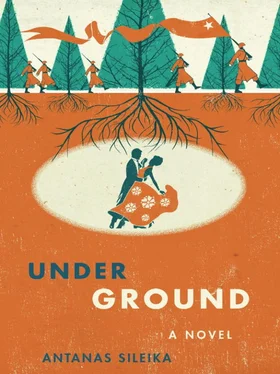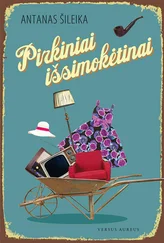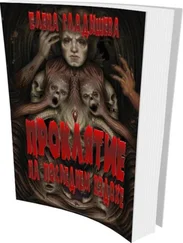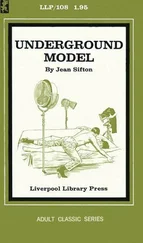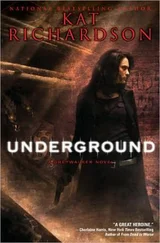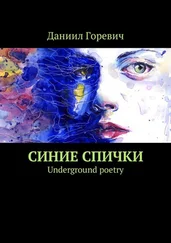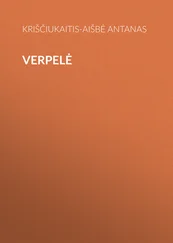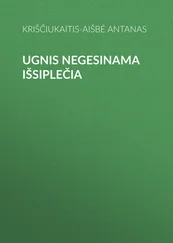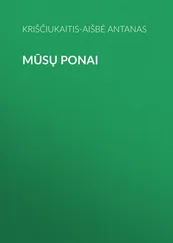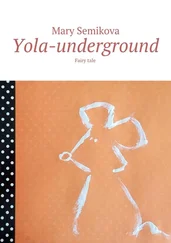Lukas held out his hand.
Kuolys took his hand and shook it distractedly.“Put your bag in the corner there and go out to check on the library archive for me, will you? I’m on the housing committee and nobody has a place to stay. But I’m worried about the Latin books I’ve stored in the stacks. Who else would care?”
“I don’t have anyplace to stay either,” said Lukas.
“Then come back here after you’re done and camp out with the rest of us. Plenty of us are at loose ends. Is everyone in the family all right?”
“Yes.”
“Is Vincentas back at the seminary?”
“I just dropped him off there.”
“You might tell your brother that I could put him in an advanced Classics class here, if he wants. It might be safer. The new regime doesn’t like priests much.”
“He always wanted to be a priest. He’s like a bird who only knows one song.”
“We’ll all have to learn to sing new songs now. Get to that archive. I have someone to help you.”
Rimantas was a student as well, a year younger than Lukas and a year behind in his studies. Rimantas was reedy and tall and walked with a slight stoop, as if to minimize his height. He had a pale, scholar’s face, and the habit of chewing on the inside of his right cheek, which gave him a twisted, comical look.
“I’m glad they’re sending us to the archive,” said Rimantas.
“Why?”
“We’re literature students, aren’t we? I haven’t read anything decent for months. Maybe we can borrow something. Have you read anything good recently?”
“Who’s had time to read? I had to help with the farm work over the summer, and spent my nights hiding from the Reds.”
Rimantas nodded skeptically. “True enough. But I can’t stand doing nothing with my mind. I waited for two hours for my turn with the officer who stamped our exemption papers. I was dying of boredom. No newspapers in the waiting room. Everyone a stranger. I tried to compose poetry in my head because I didn’t have any paper to write on, but I couldn’t even settle on a single couplet.”
For all the bustle at the university, Rimantas seemed lethargic. Having him around was like dragging a reluctant, talkative donkey. “Poets need to suffer,” said Lukas.
“Yes. They say the best always need to suffer. Is that a homespun shirt I see beneath your tie?”
Lukas reddened. Homespun was a sign of country folk, looked down upon by the sophisticates. Lukas had been proud of his homespun shirt, made from flax grown in the family fields, but it would do no good to defend farm values against Rimantas.
Although Lukas had been attracted to the idea of café society in the city, he found Rimantas a little too artistic for his taste. Rimantas had stood out in university by wearing dramatic clothing in his first year, a long black raincoat, too hot in the fall and too thin for the winter. For a while he’d even worn a beret. His mother was a minor opera singer, so Lukas forgave him his pretensions, believing that a child raised in cafés was bound to be different from one raised on a farm.
A collapsed arch blocked the entranceway to the courtyard in which the library archive lay. The front of the building had been either shelled during an artillery barrage or blown up by the retreating Germans, although it was unclear what military significance it might have had. The young men searched through the alleys before they found another way into the courtyard. Cigarette butts, papers and tins lay on the cobblestones, and the door to the archive was locked. But the bars on the window to the right had been torn off and the glass was broken. Lukas reached inside, opened the window latch, and the two clambered in.
Someone had been in before them. Hundreds of books lay open on the floor, some of them burned and some of them ripped. To see such destruction of expensive books troubled Lukas more than the sight of the ruined buildings in the streets.
The archive was uncannily quiet. Dust motes rose into the air and hung there in the shafts of light that came through the small windows. All of Kaunas was dusty from the earth churned up by military vehicles, from mortar and stone and soot particles that rose up after explosions and hung in the air for days and weeks at a time before settling on the city, ready to be stirred again.
Lukas and Rimantas talked quietly to one another, as if a stern librarian might appear at any time, and yet they were possessed by an unexpected sense of adventure, never having had such access to so many books before. If they had had food, they could have settled down in those rooms and read until Germany surrendered.
A translation of H.G. Wells’s The Time Machine lay open on a table as if someone had been interrupted while reading it. Glancing at the Wells book, Lukas reflected that the world had been turned inside out: the Morlocks had come up from the underground to rule, and now the Eloi would need to burrow down to escape their slaughter. Either that or find a little of the Morlock in themselves.
Outside, a sudden roar rose up and a motorcycle rattled the windows before echoing down the narrow street.
When the two students made their way deeper into the stacks, they found a long study table heaped with files. They were the students’ records, and among them they found their own files.
“Listen to this,” said Rimantas, reading about himself. “‘Keeps irregular hours. Missed final Latin exam—claimed to be ill. Has a knack for writing satiric verse.’”
“Sounds about right,” said Lukas.
“Yes, but listen to the rest: ‘Editor of the second-year student paper. Writes spoofs of Stalin.’” Rimantas looked up at him.
“Well, did you?”
“Of course I did! How can you not make fun of Stalin? That moustache and that pipe! Ridiculous. His clothes are a fright, and yet he’s the leader of a country—he could wear anything he wants. What does your file say?”
“‘Member of Catholic Youth League in high school.’”
“A death sentence,” hissed Rimantas. “This is all subversive activity.”
“You’re exaggerating.”
“But it will do you no good. ‘Religion is the opium of the people,’ remember? We need to destroy these.”
“What if we ever need transcripts? We’ll be killing our academic careers if we do that.”
“And we’ll be killing ourselves if we don’t. Nobody is going to ask for your transcripts in prison. We have to save ourselves—that’s our first responsibility.”
They burned the files in a large fireplace. Once their own sins had been turned to ashes, they regarded the stack of files on the table. Hundreds of other students, their friends, would go to hell if their pasts were uncovered. So they burned everything, though the chimney was partially blocked and smoked terribly, and the soot from their files rose up to join the rest of the dust hanging over the city.
The chaos at the university made going back to school all the more exciting that fall. Some of the lecture and study halls had no electricity, and it was difficult to take notes in them or read on overcast days. Other rooms had no desks, and the students sat on their books and coats like novices in an Asian monastery. Most of the food shops were closed because there were no goods to be had, and the students with farm relatives fed themselves with supplies from home and exchanged homegrown tobacco for rare items such as lighter flints, fountain pens and blank paper upon which to write.
At first the only danger lay with soldiers who resented the sight of able-bodied young men going about ordinary lives. Students were liable to be stopped on the streets for document checks in order to justify their being in the city instead of at the front. Some of the soldiers were not that impressed by university exemptions and needed to be bought off with cigarettes, liquor or food.
Читать дальше
